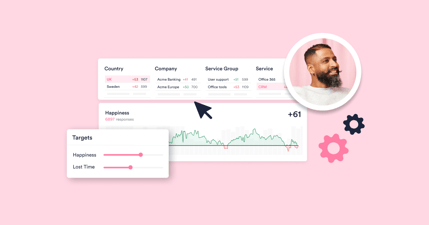What is Experience Level Agreement?
When speaking about experience, the focus is usually the end-user's experience, whether they are a customer or an employee.
Experience Level Agreements (XLAs) and IT Experience Management, on the other hand, are always discussed from the perspective of management and IT teams who aim to impact end-user's experience, and what it means for an organisation to implement such change.
However, there has never been a discussion on the benefits of Experience Management for different roles in the organisation. From our Practical Guide to XLAs, we approach this subject to show how the whole company and many business roles benefit from Experience Management, for different reasons.
We cover a wide variety of business roles that Experience Management benefits, including:
- End-users (Employees)
- IT Departments Employees (Agents also)
- Service Desk Managers
- Service Owners / Service Desk Outsourcing
- IT Directors / CIOs
Key benefits of XLA for different business roles
The following article and examples are written from the perspective of a 10,000 employee company.
Empower your End-users
A common phrase or perspective used by large enterprise's end-users is "I don't want to call IT as they just want to get rid of me, and make me feel like my IT incident is my fault".
SLAs are at fault for this, due to IT departments having metrics related to outputs, rather than metrics related to experience and outcomes.
In our product, HappySignals prompts the recipient to estimate how much lost work time (productivity) they have lost due to their IT incident and how long it took to fix by the IT service desk.
When discussing this with IT people, they would state that this is a difficult question. However, if you put this question to the end-users, they would say "Finally IT is interested in me, my problems and my time".
Delivering an IT service should never primarily focus on how quickly you can resolve a customers case. Instead, service needs to be determined from an end-user's perspective, whether their problem was solved and whether it was a positive experience.
Furthermore, suppose your IT or management team is actively asking end-users how their experience was? In that case, it will also boost productivity and happiness as they are included in the improvement cycle of IT services.
Bring end-users into the conversation, and it will give a tremendous amount of insight into their everyday experience, as well as their needs for today and the future. Tailoring an experience to meet end-user's needs will deliver not only highly happy and productive employees but an increase in business value and revenue.
Motivate the IT Department
An IT department coming to work each day to essentially "keep the lights on" will slowly start to make them feel like shelf-ware.
On the other hand, Experience Management gives your IT department purpose and therefore, motivation to come to work each day, as they are impacting the daily lives of many.
When your IT department can make their end-users happy, they are essentially making the businesses customers happy. Happy employees lead to happy customers.
Experience Management also benefits the IT department in the form of positive feedback. We have found that 75% of all feedback is in fact, positive. That is an astounding number and a tremendous amount of positive feedback that your team is currently missing out on receiving.
Not only this but when negative feedback is received, your IT department now has an actual project to work on which will result in improving something for their end-users, again impacting daily lives.
Increase Cooperation with Vendors
Whether your service desk is internal our outsourced - having sanctions in your agreements is not motivating, nor allowing your service desk providers to deliver a high-quality service. Sanctions bring panic and fear that the service desk agent has to meet this set in stone SLA, and if they don't, then their job could be in jeopardy.
IT Experience Management offers a different outlet to discover how and where your end-users are experiencing difficulties. By improving these difficulties, delivers a better experience for them. This creates an entirely new level of motivation to your Service Desk agents as they are not under pressure to meet an SLA but to come to work each day and help people.
Instead of having sanctions in your agreements, include rewards instead (or in tandem). Not only does this create more motivating work for your vendors by actually helping people daily, but will also increase their cooperation to deliver an extraordinary experience continuously.
It is almost black and white. SLAs and sanctions create more pressure on service desk agents to reach the agreement and most likely, not deliver a high-quality service. XLAs and rewards, on the other hand, allows agents to provide a high-quality service, which results in end-users IT incidents solved, a positive experience and greater productivity and happiness.
Real-time data for Service Owners
Real-time, data-driven decision making is a godsend for Service Owners, making their jobs easier, as well as allowing them to be proactive when specific services are not working efficiently.
Data eliminates the need for 'gut-feeling' fixes, and through Experience Management, your team can directly choose where they can improve happiness and productivity.
Furthermore, Experience data creates a purpose for justification on new proposals on what service may need funding, to save money in the future.
Create focus for your management teams
Cutting costs is usually a frequent discussion that occurs annually, with IT frequently being on the receiving end.
Experience Management enables the IT Director and CIO to justify their IT budgets and spending, by showing experience data on how they can impact their end-users productivity and happiness.
Not only this, but Experience Management provides clarity and focus for the IT management team. Instead of wasting vast amounts of money on digital transformation with no cause and effect, they can now focus directly on the problems that need fixing and what end-users are giving feedback on what needs to be changed or improved.
Through focused improvements and changes, you can save a lot more money.




